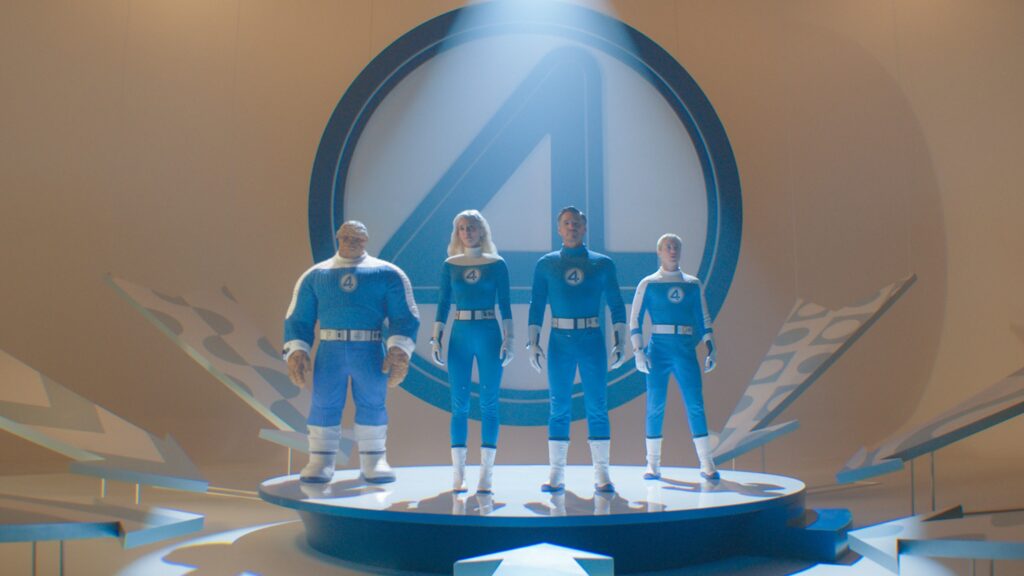It won’t fix Marvel movies, but it would be cool

In 1961, some combination of longtime Marvel Comics editor-in-chief Stan Lee and his frequent collaborator and lifelong frenemy Jack Kirby created a team of superheroes called The Fantastic Four. These characters launched Marvel as the superhero powerhouse it is today, and inspired — among other things — three of the worst live-action comics adaptations of the 21st century.
Last month, Marvel released the first teaser trailer for the latest attempt to bring the Fantastic Four to the big screen, a 1960s-set adaptation which bravely asks “What if The Thing was Cousin Richie from The Bear?”
The main thing about this new Fantastic Four movie1Which is officially called The Fantastic Four: First Steps, because it’s the 1960s and they’re astronauts. is that the Walt Disney Corporation needs it to make a billion dollars or else everyone at the ABC affiliate station in Cincinnati will be replaced by AI deepfakes or something, but it would be nice if just for once they put an MF DOOM song in one of these things.
Because over the past quarter century of middling big screen Fantastic Four stories, as previously B-tier characters have become stars of Marvel’s cinematic empire, the main point of connection between the Fantastic Four and non comic book reading parts of popular culture was the music of the late Daniel Dumile.
In the early 1990s, Daniel Dumile and his brother Dingilizwe were a moderately successful hip-hop duo called KMD, in the mold of the other socially-minded Long Island backpack rappers of the time like De La Soul. Then a series of label shenanigans and personal tragedies, foremost among them Dingilizwe’s death, left Dumile destitute and slightly embittered.
In Viktor von Doom, the cartoonish Eastern European mega-villain counterpart to the Fantastic Four, he found inspiration for a new rap persona: In the comic, von Doom is a big-hearted scientist who experiences great loss and decides to make his problem the world’s problem. And so Daniel Dumile became MF DOOM, the rap supervillain, channeling his pain into a new sort of left-field weirdo rap, full of chopped up yacht rock and intricately crocheted rhyme schemes.
MF DOOM was never the most popular rapper in the world, but he was immensely beloved by a cultish following of craft-obsessed rappers like Earl Sweatshirt and Tyler, The Creator and legions of nerds with WhoSampled.com bookmarked in their web browsers.2I personally don’t know anyone like that, but I’d imagine they’re out there.
That following grew over the course of the two decades between the release of DOOM’s first album Operation: Doomsday and his death in 2020, even as his output became less and less frequent and he spent the last decade of his life barred from entry to the United States because he technically never became a citizen. Even without much new music, the music and the iconography was dense enough to return to time and time again.
All this to say that a significant part of the cultural significance of the Marvel comics character Doctor Doom is wrapped up in the music of MF DOOM, and it would be cool if the Marvel Cinematic Universe acknowledged that in some way. Marvel Comics at least did, incorporating a couple of lines from the song “Accordion” at the start of the first Doctor Doom solo run after DOOM’s passing.
Marvel paid tribute to the late MF DOOM with a line from “Accordion.” 🕊️
— Complex Pop Culture (@ComplexPop) May 17, 2024
It’s the first DOOM comic since MF DOOM’s passing. pic.twitter.com/mnDKYdwof7
In part, I do understand that what I am asking is an expression of the most braindead part of modern pop culture, where every mainstream piece of entertainment is composed of a series of gestures at older, better pieces of entertainment. And so I should acknowledge that I am not necessarily above clapping like a seal at the dangling keys, so long as the dangling keys are ones that I think are good and important.
But to briefly make the case beyond “I think it would be nice and make me feel happy,” there are reasons that an MF DOOM needledrop in a Marvel would be at least slightly meaningful.
On the most practical level, it would be nice to see Dumile’s family get paid. DOOM was notoriously cash conscious: Very few rappers have ever put their preferred contract structure on record,3“Half up front, half upon mastering”
and he notoriously used to send other dudes out in a masks to rap in his place so he could collect his appearance fees without actually working. But because of his arbitrary exile from the United States and his early — and potentially preventable — death, he never had the opportunity to really cash in on his post-2010 internet-abetted fame.
More to the point, he never had the opportunity to really cash in on the genuinely mainstream fame of artists who grew up obsessed with him. DOOM had a dedicated cult following, but Tyler, The Creator sells out stadiums. They had a pop-up merch tent and am orchestral tribute to MF DOOM at Camp Flog Gnaw, the Odd Future music festival, but it feels likely that had he been able to actually return to the United States he would have been a regular performer there while he was still alive, with access to all of the additional money and new fans associated with that.
The case for Marvel to do this is that nodding towards MF DOOM would fix at least one problem the MCU has, which is the way it increasingly feels siloed off from the real world and any other form of entertainment. Sure, directors go on their press tours and say that the new Captain America movie is more like a conspiracy thriller or that the new Doctor Strange will be like a body horror movie or something like that, but ultimately “Marvel” is a genre unto itself. And as the cinematic universe has become more expansive and unwieldy, it’s a genre that feels flat and more than a little copy-paste. All these movies look the same, and they all sound the same, not least because the only music that is allowed to prominently feature in them are references to Alan Silvestri’s original score for The Avengers.
It is worth noting that probably the two best MCU movies of the last decade or so — Black Panther and Thor: Ragnarok — are relatively unburdened by connective tissue or larger universe building and are allowed to sound like their own unique stories. Black Panther has a creative Ludwig Göransson score that blends traditional West African music with modern 808s and hip-hop sounds, while Ragnarok recognizes that all anyone really wants out of the inherent silliness of a Thor story is at least one scene of well-choreographed fighting set to Led Zeppelin’s “Immigrant Song.”
There are a few obvious hurdles here. Firstly, the character of Doctor Doom is definitely not going to be introduced in The Fantastic Four: First Steps, because Robert Downey, Jr. has been cast in the role as a marketing stunt to revive interest in the franchise and generate excitement for Avengers Doomsday. That is, clearly, a different movie.
Secondly, this movie is set in the 1960s, which means the score will probably be hyper traditional and any pop music will be late period Frank Sinatra, early rock n’ roll novelty acts, and other songs that Don Draper listen to while solemnly drinking an Old Fashioned. DOOM songs obviously don’t fit that vibe.
So it probably won’t happen in the 2025 Fantastic Four movie. But over the past five years or so, Marvel Studios has stopped making films and started making extremely expensive homework assignments. Once you get to the point where you have to watch at least two seasons of TV and between two and three movies to understand what’s going on in a side adventure movie like The Marvels, you start to wonder what the point of all of this is. Increasingly, Marvel movies treat their characters less like individuals and more like intellectual property to be managed.4For what it’s worth, The Marvels has a scene in which the heroes evacuate a spaceship by having aliens that look like housecats temporarily eat the inhabitants, set to “Memories” from Cats, which is memorable, if nothing else.
The story of any given Marvel film has less to do with telling a complete arc for a given superhero and more to do with ensuring that they are correctly positioned to be part of the next big crossover movie.
An MF DOOM needledrop does not fix the weight of interconnected universe-based storytelling, something that famously turned droves of casual fans away from comic books a full quarter century before it started to hamstring comic book movies. What it might do, however, is send a signal to the viewer that what they are watching is closer to a real movie.
It says “Here is a song that you might recognize from somewhere else. This is a song that says something about the characters you are seeing and the tone of the story that will unfold. What you are witnessing is not simply a major corporation moving numbers around, but a story written by humans that has a connection to the human world.”
Most importantly, though, Marvel should put an MF DOOM song in one of these movies because MF DOOM was one of the best to ever do it, and now he’s dead and no one will ever be able to hear him perform live again and that’s an inescapable tragedy but at the very least we might be able to see something like the character he invented for himself rendered on the big screen for once.
And finally, they should do it because it would be cool, and some of us have been annoying about this for nearly a decade:
If the new Fantastic 4 movie doesn't have any MF Doom in it I quit movies
— Jon Lewis (@jlewis5211) May 9, 2015


Leave a Reply